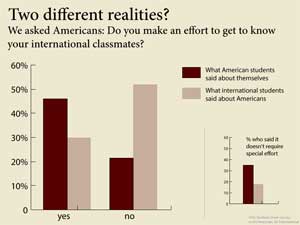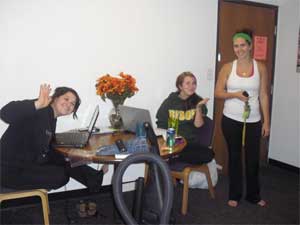I will never forget my very first conversation with an American. He was an employee at Dulles Airport in Washington, D.C. I was a new arrival, highly exhausted after almost 20 hours of flight.
Upon landing I found myself overwhelmed by homesickness, and very badly wanted to find a telephone to call my parents. I went up to this man to ask for help, but blanked immediately after opening my mouth.
I did eventually ask for the phone and call my parents, but I was so frustrated by that experience. It was as if I had never learned English before! I was considered to be good at English in China, yet I almost felt the worker at the airport was talking to me in another language.
My mind was blown again when I ate at an American restaurant for the first time. I had no idea that most of the words I had learned for food were about fast food.
It is true that we international students take the TOEFL exam before coming to the U.S., and this exam seems well-balanced in listening, speaking, reading, and writing. But it still doesn’t fully prepare you for what it’s like to be immersed in a language.
Why academics turned out to be the biggest struggle
It was inside the classroom where I really had trouble at first. I could understand lectures for the most part, except for certain accents that I had not been exposed to before. However, participating in classroom discussion was very hard.
I was so shocked by my American classmates’ thought-provoking and nicely-phrased comments that I did not even try to speak out – not because of a lack of ideas, but because of a lack of confidence in my English. Since we have many interactive, small-sized classes at my school, not being able to participate in classroom discussions disappointed me very much.
[More about surviving academics in English]
Writing papers was also difficult, which was a problem because as a liberal arts major my life is always occupied with writing—lots and lots of writing. In my first semester, I would always receive comments on my papers like, “Try to be more clear (explicit),” no matter how clear and explicit I thought my papers were.






 The biggest obstacle for me is how to “market” myself in
The biggest obstacle for me is how to “market” myself in  What Does it Mean to "Be American" as a Chinese Student?
What Does it Mean to "Be American" as a Chinese Student? Don't Study in the US: A Look at the Pros and Cons
Don't Study in the US: A Look at the Pros and Cons Why Aren't Americans and International Students Becoming Friends?
Why Aren't Americans and International Students Becoming Friends? The Truth: Americans Reveal What They Really Think of International Students
The Truth: Americans Reveal What They Really Think of International Students Disability, Difference and Left-handedness in China and America
Disability, Difference and Left-handedness in China and America What is the Best University in America?
What is the Best University in America? On Being an African in the US: Navigating an Endless Set of Stereotypes
On Being an African in the US: Navigating an Endless Set of Stereotypes Take a Tour Around my Typical American Dorm Room
Take a Tour Around my Typical American Dorm Room Just When I Learn the Answers, They Change the Questions: A Zimbabwean's Journey
Just When I Learn the Answers, They Change the Questions: A Zimbabwean's Journey Why a Weak SAT Score Didn’t Kill My College Dreams
Why a Weak SAT Score Didn’t Kill My College Dreams How to Speak English Fluently?
How to Speak English Fluently? How I'm Going to Get into Medical School as an International Student
How I'm Going to Get into Medical School as an International Student